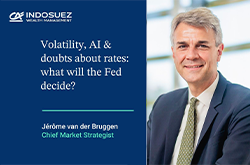COVID-19, the President and the Markets

Monthly House View - November 2020 - Download here
Are markets focusing on the right catalysts and risk factors?
This question is the centre of a complex equation for investors ahead of this unusual US election.
One can notice that there is a paradox in the recent behaviour of markets. On the one hand, the increasingly likely victory of Joe Biden does not seem to scare investors, as per the positive momentum on US equities over the last two weeks. On the other hand, the growing probability of a blue wave in the House of Representatives (that could also potentially lead to a Democrat Senate) could mean a greater probability of fiscal reform that could in turn negatively affect US corporate earnings.
In the last two weeks, markets were increasingly focusing on the hopes for a fiscal deal, that will not necessarily be concluded before the election, but that should take place one way or another, whoever will seat in the Oval office from next January. From that perspective greater attention is brought towards cyclical stocks, which may have put the election outcome in the backseat.
Nevertheless, that does not mean that investors are ignoring the risk of an unexpected outcome, such as a disputed election arbitrated by the Supreme Court. One just has to look at the elevated, implied volatility of equities to understand that many hedging strategies have probably been implemented. The unwinding of these could result in a positive market direction post election results, whatever the outcome and just because the uncertainty factor has disappeared.
Beyond the US election, investors need to remain lucid and focused on what fundamentals tell us. In that respect, the picture sends somewhat diverging messages between the US and the Euro Zone, and between the macro economy and the bottom up signals from the current earnings season.
On the macro front, divergence seems to increase between China, US and Europe, and confirms our hierarchy between geographies in terms of equity allocation: a very constructive view on China which is the only large economy that is growing in 2020 compared to 2019; and a preference for US equities over European ones which have been mostly flat since June.
On the bottom up front, the earnings season seems to start with positive surprises, which could result in good momentum for earnings forecasts for the year-end, even if 2021 forecasts can be seen as ambitious.
Will this landscape and hierarchy of preferences change as we progress into the year-end and pass this election hurdle? We feel that this election will not be neutral for markets. Beyond short-term reactions, the agenda of the next administration could impact the US curve and the dollar, which in turn will impact the sectors and geographies that investors may favour in this new context.
A victory of Biden could be a catalyst for an outperformance of cyclical stocks and emerging assets in 2021, after a year dominated by US equities, quality stocks and the technology sector (which also explains the outperformance of China). In most cases, Chinese assets could continue to perform well, whilst uncertainties remain in Europe, despite the strong appeal of lower valuations and attractive opportunities that can be found in mid-caps and environment-focused companies.
In short, investors should not overreact to the US election, but can prepare for the aftermath of this political event, whilst implementing some strategies to hedge against unexpected outcomes.
Monthly House View, 22/10/2020 release - Excerpt of the Editorial
October 29, 2020




